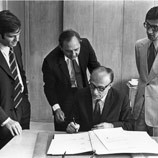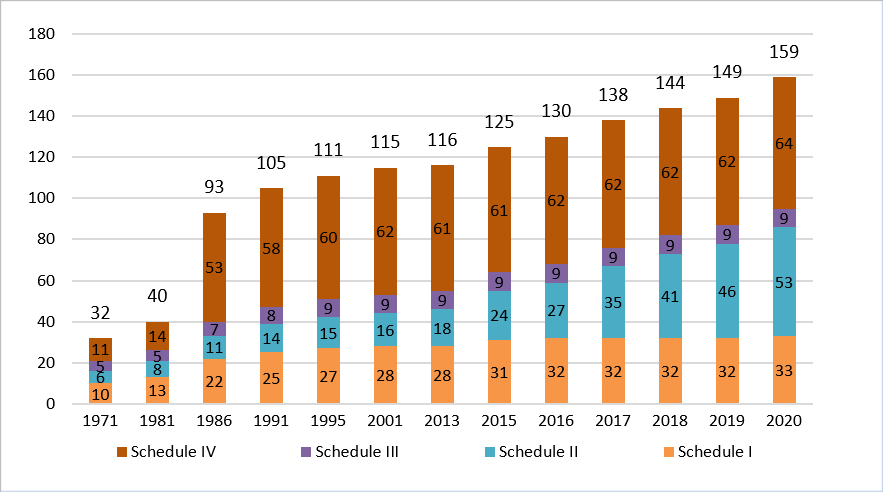50 Years of International Control in Psychotropic Substances

VIENNA, 19 February - Half a century ago, on 21 February 1971, the Convention on Psychotropic Substances was adopted and opened for signature.
Following concerns expressed by many countries in the 1950s and 60s about the widespread misuse of hallucinogens, barbiturates, amphetamines and tranquillizers, representatives of 71 States gathered in Vienna to adopt the Convention on Psychotropic Substances, creating a system applicable still today. The Convention was signed by 34 States at the time of its adoption, and enjoys nearly universal adherence today, with 184 State Parties.
Recognizing that the use of psychotropic substances for medical and scientific purposes was indispensable, the 1971 Convention extended-for the first time in history-international regulation of manufacture and trade to psychotropic substances. The Convention requires States Parties to maintain a system of control and to implement measures to combat illicit traffic in controlled psychotropic substances. It also requires States to take measures for the prevention and treatment of abuse, and rehabilitation of persons affected, and to take into consideration the principle of proportionality inherent to criminal justice.
Initially, 32 psychotropic substances were placed in four schedules of varying degree of control. Over the years, control measures under the 1971 Convention were extended to over 150 substances, including a number of amphetamine-type stimulants, hallucinogens (including LSD), sedative hypnotics and anxiolytics (such as barbiturates), analgesics and antidepressants. Of those, the Board has seen between 30 to 40 psychotropic substances having a significant presence on the licit market in recent years - manufactured, traded and consumed for medical purposes. Detailed information on market activity is published annually by the Board in its technical report on psychotropic substances.

Number of substances controlled under the 1971 Convention on Psychotropic Substances
The 1971 Convention provides a legal framework for the control of a number of important and indispensable medicines. Psychotropic substances are essential for the treatment and management of a wide range of medical conditions, in particular mental and neurological health conditions, and for the induction of anesthesia in preoperative procedures. Their relevance in medical practice became even more evident during the ongoing COVID-19 pandemic.
The Board has faced a challenge in monitoring and assessing the availability of psychotropic substances in many parts of the world, due to inconsistent or non-existent consumption data. Available information indicates that these substances may be almost inaccessible to some populations, and that resources allocated to addressing mental health disorders may have been inadequately and inequitably distributed. Countries continue to be urged to assess their medical needs, measure their national consumption and submit their data to the INCB. To that end, the Board has compiled commonly used methodologies for the collection of data on consumption of psychotropic substances, which it will make available to countries in the coming months.
This 50th anniversary of the adoption of the 1971 Convention marks an important milestone in the development of the international legal framework for drug control, and in the regulated trade of substances that are indispensable for medical purposes but liable to abuse. The Board looks forward to continuing to work with Governments to ensure availability of and access to psychotropic substances in line with sound medical practice.